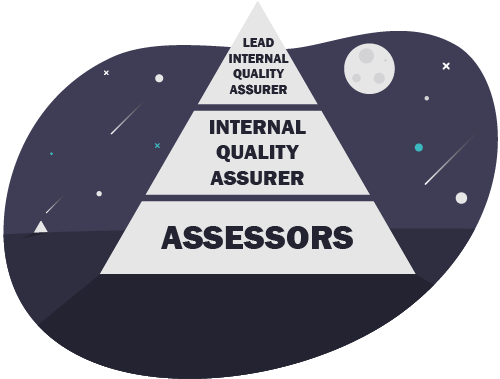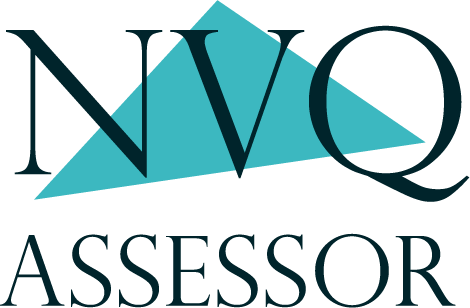What You Need to Know to Become an IQA / Lead IQA
Are you seeking a senior position within the company with equally senior pay? Maybe you wish to deliver a standard in Hair and Beauty or Childcare but need an IQA to receive accreditation from an Awarding Body? In this article, we will delve into roles and responsibilities of the job. Followed up by the exact steps you need to take to become an IQA / Lead IQA.
ROLES AND RESPONSIBILITIES
Maintaining that Assessments are conducted to a fair and high standard, as it should be outlined in the company policies. An IQA and a Lead IQA uphold the quality of the qualification standard delivered to clients. They are responsible for many key areas of a Training Provider such as;
- Applying standardised practice agreed in the Standardisation Meeting
- Supporting the improvement of Assessor practice by providing constructive feedback
- Plan, schedule and designate an IQA to monitor parts of an Assessment
- Sample learner work, assessment records and decisions to check for quality, consistency, and fairness
Traditionally, an Internal Quality Assurer is on the same level as a Manager/Supervisor due to their responsibility for managing Assessors. This means if you come from a managerial, supervisory or above position, you already hold some characteristics and experience needed to function in this role effectively. Below you can see the hierarchy of a Lead Quality Assurer, Internal Quality Assurer and Assessor:
You can expect the team Assessors you need to manage will be as small as yourself if you are starting your own company. Or, as large as fifteen people. Naturally, this is not an exact number, just an idea to get you thinking about how many people you should expect to oversee. Other factors like qualification standards will also affect the number of people below you
The Health and Social Care sector has consistently had a high demand for staff ever since the NHS staffing crisis of 1998. Therefore, quite a few companies deliver between Level 2 and 5 Health and Social Care qualifications to meet demand. As such, you can expect to monitor a larger team of Assessors in comparison to a company delivering an Apprenticeship standard in Cyber Security Technology.
HOW TO BECOME AN IQA / LEAD IQA?
We must preface this with that there are no requirements to become an IQA, however, that does not mean you will be accepted onto a course. Just like if you were to apply to a university, a training provider is required to judge if you are competent enough to complete the course.
“Centres should review the applicant’s prior qualifications and/or experience, considering whether this profile shows that they have the potential to achieve the qualification.” – (Edexcel Pearson, 2010)
As of writing this, there is no metric for ‘potential’, in our opinion, it is referring to common sense. A college graduate who has no industry experience is highly unlikely to be able to complete the course and go on to effectively apply that knowledge. Whereas, no one would bat an eyelid if a Hair and Beauty Assessor with three years’ experience wanted to become an IQA. If you do not possess an Assessor qualification (D32, A1 or CAVA), check out our article here.
INTERNAL QUALITY ASSURER
Currently, the way to become an IQA is to gain the ‘Level 4 Award in the Internal Quality Assurance of Assessment Processes and Practice‘. It is comparable to the old Internal Verifiers qualification (D34). This allows you to plan and maintain the internal quality assurance of assessment within your organisation.
It contains two units, with a Guided Learner Hours of 90:
- Unit 1: Understanding the Principles and Practices of Internally Assuring the Quality of Assessment
- Unit 2: Internally Assure the Quality of Assessment
It is perfect for people who want to take the next step in their career as an Assessor. Starting out you can expect an average income of £29,000 but after a few years’ experience, upwards of £38,000 (talent, 2021) unless you decide to train to become a Lead IQA with a higher potential salary.
LEAD INTERNAL QUALITY ASSURER
This is the more senior position of the Internal Quality Assurer. If you desire to become a Centre Lead or Quality Nominee you would need to gain the ‘Level 4 Certificate in Leading the Internal Quality Assurance of Assessment Processes and Practice‘ qualification. It is also the recommended role for the head of a training provider.
It is comprised of three units, with a Guided Learner Hours of 115:
- Unit 1: Understanding the Principles and Practices of Internally Assuring the Quality of Assessment
- Unit 2: Internally Assure the Quality of Assessment
- Unit 3: Plan, Allocate and Monitor Work in Own Area of Responsibility
Upon qualification, you can Internal Quality Assure for the entire training centre. This means developing and writing Internal Quality Assurance policies and procedures. Something that awarding bodies will want to see in an External Quality Assurance (EQA) visit. Expect that these will take place once a year, or sooner depending on the rating given to the training centre.
Taking into account factors that will affect your average salary such as; location, occupation and experience. You can expect your starting salary to be £31,000 and it should increase to £40,000 after a few years of experience (talent, 2021).
That sums up the meat and potatoes of what you need to know. You should be aware of what is expected of you from the role and what qualification you need to gain. If you found this article helpful or have any questions please let us know at; hello@nvqassessor.org.uk. Otherwise, feel free to share the post with friends and colleagues.
Are you seeking a senior position within the company with equally senior pay? Maybe you wish to deliver a standard in Hair and Beauty or Childcare but need an IQA to receive accreditation from an Awarding Body? In this article, we will delve into roles and responsibilities of the job. Followed up by the exact steps you need to take to become an IQA / Lead IQA.
ROLES AND RESPONSIBILITIES
Maintaining that Assessments are conducted to a fair and high standard, as it should be outlined in the company policies. An IQA and a Lead IQA uphold the quality of the qualification standard delivered to clients. They are responsible for many key areas of a Training Provider such as;
- Applying standardised practice agreed in the Standardisation Meeting
- Supporting the improvement of Assessor practice by providing constructive feedback
- Plan, schedule and designate an IQA to monitor parts of an Assessment
- Sample learner work, assessment records and decisions to check for quality, consistency, and fairness
Traditionally, an Internal Quality Assurer is on the same level as a Manager/Supervisor due to their responsibility for managing Assessors. This means if you come from a managerial, supervisory or above position, you already hold some characteristics and experience needed to function in this role effectively. Below you can see the hierarchy of a Lead Quality Assurer, Internal Quality Assurer and Assessor:
You can expect the team Assessors you need to manage will be as small as yourself if you are starting your own company. Or, as large as fifteen people. Naturally, this is not an exact number, just an idea to get you thinking about how many people you should expect to oversee. Other factors like qualification standards will also affect the number of people below you
The Health and Social Care sector has consistently had a high demand for staff ever since the NHS staffing crisis of 1998. Therefore, quite a few companies deliver between Level 2 and 5 Health and Social Care qualifications to meet demand. As such, you can expect to monitor a larger team of Assessors in comparison to a company delivering an Apprenticeship standard in Cyber Security Technology.
HOW TO BECOME AN IQA / LEAD IQA?
We must preface this with that there are no requirements to become an IQA, however, that does not mean you will be accepted onto a course. Just like if you were to apply to a university, a training provider is required to judge if you are competent enough to complete the course.
“Centres should review the applicant’s prior qualifications and/or experience, considering whether this profile shows that they have the potential to achieve the qualification.” – (Edexcel Pearson, 2010)
As of writing this, there is no metric for ‘potential’, in our opinion, it is referring to common sense. A college graduate who has no industry experience is highly unlikely to be able to complete the course and go on to effectively apply that knowledge. Whereas, no one would bat an eyelid if a Hair and Beauty Assessor with three years’ experience wanted to become an IQA. If you do not possess an Assessor qualification (D32, A1 or CAVA), check out our article here.
INTERNAL QUALITY ASSURER
Currently, the way to become an IQA is to gain the ‘Level 4 Award in the Internal Quality Assurance of Assessment Processes and Practice‘. It is comparable to the old Internal Verifiers qualification (D34). This allows you to plan and maintain the internal quality assurance of assessment within your organisation.
It contains two units, with a Guided Learner Hours of 90:
- Unit 1: Understanding the Principles and Practices of Internally Assuring the Quality of Assessment
- Unit 2: Internally Assure the Quality of Assessment
It is perfect for people who want to take the next step in their career as an Assessor. Starting out you can expect an average income of £29,000 but after a few years’ experience, upwards of £38,000 (talent, 2021) unless you decide to train to become a Lead IQA with a higher potential salary.
LEAD INTERNAL QUALITY ASSURER
This is the more senior position of the Internal Quality Assurer. If you desire to become a Centre Lead or Quality Nominee you would need to gain the ‘Level 4 Certificate in Leading the Internal Quality Assurance of Assessment Processes and Practice‘ qualification. It is also the recommended role for the head of a training provider.
It is comprised of three units, with a Guided Learner Hours of 115:
- Unit 1: Understanding the Principles and Practices of Internally Assuring the Quality of Assessment
- Unit 2: Internally Assure the Quality of Assessment
- Unit 3: Plan, Allocate and Monitor Work in Own Area of Responsibility
Upon qualification, you can Internal Quality Assure for the entire training centre. This means developing and writing Internal Quality Assurance policies and procedures. Something that awarding bodies will want to see in an External Quality Assurance (EQA) visit. Expect that these will take place once a year, or sooner depending on the rating given to the training centre.
Taking into account factors that will affect your average salary such as; location, occupation and experience. You can expect your starting salary to be £31,000 and it should increase to £40,000 after a few years of experience (talent, 2021).
That sums up the meat and potatoes of what you need to know. You should be aware of what is expected of you from the role and what qualification you need to gain. If you found this article helpful or have any questions please let us know at; hello@nvqassessor.org.uk. Otherwise, feel free to share the post with friends and colleagues.

Building Services End-Point Assessor
The employer is a Training Sector organisation in Leamington Spa who specialise in developing qualifications for the Construction and Civil Engineering sectors. They develop a range of industry qualifications including Apprenticeships, which are developed and assessed by sector specialists with real industry knowledge. They currently have a fantastic opportunity an experienced Building Services Engineer or […]

Childcare Assessor (Trainee or Qualified)
KM have an exciting opportunity for a Childcare Assessor to deliver full Apprenticeships in Childcare! This opportunity is open to both Trainee and Qualified candidates. Trainee applicants – this is a great opportunity for a Room Leader (or above) to transition to a new and rewarding career within the training industry! Qualified Assessors – applications […]

Skills Tutor
Educated Appointments are delighted to be supporting a fast-growing premier provider of accountancy training and apprenticeships. Due to increased demand for apprenticeship training programmes they are looking out for new Tutor to join our team. This role sits within the Impact Skills Team and ultimately reports to the Programme Delivery Director. This role includes travel […]

Business and Education End-Point Assessor
The role of an Apprenticeship End-Point Assessor is to provide independent, fair, reliable, and consistent assessment services to Training Qualifications UK customers working with Apprenticeship Standards. End-Point Assessors are required to use assessment experience with robust and relevant industry knowledge to form judgements and grading decisions upon the completion of a variety of assessment activities, […]




